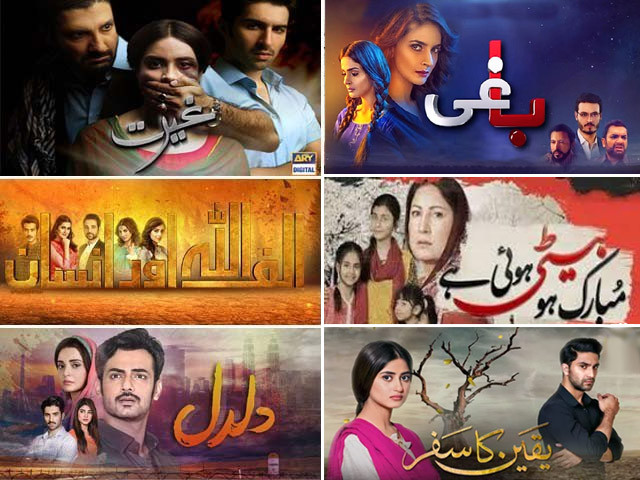Listed below are the top and flop dramas of 2017 so far:
Baaghi
The drama is consistently scoring high Television Rating Points (TRP) and gaining a strong word of mouth due to its incredible script. Saba Qamar’s portrayal of Fouzia Batool aka Qandeel Baloch is one of the audience’s top favourites now.
Qamar’s depiction of Fouzia, as she frequently likes to assert in the play, is both courageous and heart-rending. In the recent most episode of Baaghi, Fouzia is offered the opportunity to become a model in the midst of her struggle to live with an abusive husband (Ali Kazmi). This creates an important dramatic arc in the story since it was also the turning point in Qandeel’s real life, which led her to enter the media industry.
Baaghi is definitely worth a watch every week.
O Rungreza
This Sajal Ali, Noman Ijaz and Bilal Abbas Khan starrer has a romantic, poetic and old-school feel to it. Sajal, as always, is phenomenal as Sassi, the rebel with a cause who challenges her father, Khayam Sani (Noman) in an unconventional way.
Qasim (Bilal) is Sassi’s cousin who is hopelessly in love with her and Sassi resents it, being the kind of girl who would hate it if things got too boring or too easy for her liking. Written by Saji Gul and directed by Kashif Nisar, the play explores the various roles within which our society pigeonholes women.
The play also explores an interesting contrast between relationships. Khayam the poet is married to a silent, under-confident, and unromantic Mumtaz (Irsa Ghazal), while Qasim, the shy and sensitive poet, is in love with the firecracker that is Sassi.
Owing to its strong dialogues, powerful performances and a lovely soundtrack, O Rungreza also makes it to the top of the watch list.
Yaqeen Ka Safar
Based on Farhat Ishtiaq’s novel, the play charts the story of two characters, Zubia (Sajal Ali) and Asfandyar (Ahad Raza Mir), and how they come together after a long and difficult journey. Even after almost 20 episodes, the duo has not been able to begin their romantic journey. Having said that, Yaqeen Ka Safar has not had a dull moment even once.
So far, the play has highlighted numerous social issues ranging from gang rape to political influence used for criminal reasons. Furthermore, it has also illustrated domestic abuse, slut-shaming, internalised misogyny, repentance, karma and revenge.
Daldal
While the story of this play is not really picking up its pace, the subject matter, human trafficking, is piquing the interest of many. Shuja (Zahid Ahmed) is a poor struggling man who marries his cousin Hira (Armeena Khan) only because her father lives in London.
Shuja hopes to move to London in order to make a better life for himself and uses Hira to exert pressure on her parents to make it happen. The play is full of clichés (good guy with a nagging wife/poor wife with an evil husband) and gets preachy at times but it is still a ‘different’ story that is making the audience tune in.
Mubarak Ho Beti Hui Hai
Written by Faiza Iftikhar and directed by Badar Mehmood, Mubarak Ho Beti Hui Hai is a tough watch. It is tough because of its gritty storyline that barely gives you any relief. Every time something positive starts to happen in the lead character’s life, something equally terrible occurs and it’s been going on this way for many episodes.
This, however, does not mean that the drama is terrible, it just has a strong and intense message which is not very easy to swallow. What’s great about this harsh topic though, is that it would reach many people who practice this vile misogyny and through this play may even reconsider their behaviour towards women.
Ghairat
Most of the intense dramas in Pakistan are based on crimes against women. Ghairat, as the name suggests, is the story of honour killing and abuse. Usman (Syed Jibran) is a heartless and abusive brother who burns his sister (Jinaan Hussain) alive because she dares to marry the man of her choice.
The heroine of the drama, Saba (Iqra Aziz) wants to marry Zohaib (Muneeb Butt) but Usman keeps reminding her of his sister’s death as a result of wanting to defy the norms that he had set for her.
Ghairat is another intense drama and is definitely a must watch.
Teri Raza
Written by Naila Ansari and directed by Aabis Raza, this story is about Suhana (Sanam Baloch), a girl who was ready to marry the man she loved, Rameez (Shehroz Sabzwari). She, however, ends up getting married to a much older gentleman, Imtiaz (Sarmad Khoosat).
Suhana’s story seems very clichéd but the dialogues are beautiful and the story keeps shifting in and out of intrigue to keep the audience hooked.
This is definitely one of those plays you can binge-watch.
Alif Allah Aur Insaan
Based on a novel by Qaisra Hayat and directed by Ahson Talish, the play started off promisingly but seems to be floundering with the passage of time. The past couple of episodes skirt around the climax, most of which is repetitive.
The play has multiple storylines, which tend to tangle midway: Reena Begum (Ushna Shah) is a beggar turned courtesan who is now filled with even more ambition than before. Basit (Shehzad Sheikh), Nazish (Kubra Khan) and Shahzeb (Mikaal Zulfiqar) form a love triangle with Nazish in the middle. And then there is Shamu (Imran Ashraf) the transgender, who is now a heteronormative but a slightly effeminate hair and makeup artist.
What started with a lot of potential is now a mess of dragging plotlines and forced tension.
Woh Aik Pal
While watching the show, I wondered if it would ever end. To be very honest, every episode seemed like a bad déjà vu. People just keep saying things to each other and it seems like the only things worth happening have happened in the first five episodes.
Every episode since then has been a snail-paced repetition of the basic premise. The plot makes for an interesting and possibly excellent feature length film but fails to engross the audience week after week for 20-plus episodes.
Written by Samira Fazal and directed by Furqan Khan, it truly wastes the potential of professional actors like Ayesha Khan, Alyy Khan and young actors like Ramsha Khan and Feroze Khan.
Rasm e Duniya
Thank God that this one has already ended. 30 weeks of watching Haya (Armeena Khan) and Harib (Sami Khan) fight over the same things was getting incredibly annoying. Not to mention Faaris’ (Bilal Abbas Khan) moping looks that started, ended and seemed to puff the play for no reason.
What was unfortunate about Rasm e Duniya was that the performances of the front-runners of the drama were absolutely superb but the story and the plot itself were incredibly weak and implausible which brought the entire energy down.
By the end, it just seemed like a glorification of domestic and emotional abuse and the finale was as hurried as it was ridiculous. Written by Imran Nazir and directed by Roomi Insha, this multi starrer play may have started off correctly by getting some psychological dilemmas of abusive and vengeful individuals right, but there was so much that it got absolutely wrong that it’s difficult to salvage any saving grace out of it.
To sum up, dramas that have strong dialogues and a capable cast have higher chances of being received well by the audience but the story ultimately makes or breaks the chance of its success.
If the story flounders, and fails to retain the interest or if the drama is too over-packed, the audience will ultimately decide to tune out because there is no dearth of content. The stronger the story or plot is, the better the chance of being remembered for the next 20 odd weeks



COMMENTS
Comments are moderated and generally will be posted if they are on-topic and not abusive.
For more information, please see our Comments FAQ